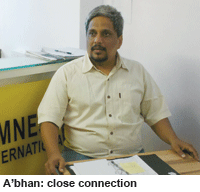 Ananthapadmanabhan G is the India country head of Amnesty International, the London-based human rights organisation (estb.1961) which investigates and exposes human rights abuses in more than 150 countries and territories around the world, and educates and mobilises public opinion to help transform society and create a safer, more just world.
Ananthapadmanabhan G is the India country head of Amnesty International, the London-based human rights organisation (estb.1961) which investigates and exposes human rights abuses in more than 150 countries and territories around the world, and educates and mobilises public opinion to help transform society and create a safer, more just world.
Newspeg. Last month Amnesy International inaugurated its India office in Bangalore. “Quite obviously India with its huge population and influence in the world has always been on Amnesty’s radar. The Bangalore office is our second innings as it were, in India. Amnesty had an India office in Delhi during 2002-07. But we ran out of funding because we failed to develop a donors base in India. Having learnt from past experience, this time round we’ve set up base in Bangalore which offers a better national perspective than the political hothouse that’s Delhi, and we are confident we’re here to stay,” says AG.
An alumnus of Kendriya Vidyalaya and IIT-Madras, AG began his career as a teacher in the new age Krishnamurti School in Chennai (1988-1999). Two years later, he signed up with the Amsterdam-based Greenpeace Foundation (estb.1971) which has been in the forefront of the global climate change and environmental sustainability movements and served in India (2001-08) and in Amsterdam (2008-10). “My experience in education and with Greenpeace made me very conscious about the importance of human rights and sustainable development, which are closely connected. Therefore I am delighted with my latest job,” he says.
Direct talk. According to AG, a major initiative of Amnesty in India will be spreading human rights awareness through school curriculums. “India needs to become a rights-respecting society. Amnesty International has developed a global programme for human rights-friendly schools which is being implemented in 300 schools worldwide. The objective of the programme is to make education leaders, teachers and parents more respectful of human rights and to eliminate caste, gender, and religious prej-udice from school environments. To this end Amnesty will conduct teacher training programmes and workshops. Simultaneously we will also educate the wider public about human rights issues through research, advocacy and cam-paigns,” says AG.
Future plans. AG is confident of the success of Amnesty’s carefully chalked out second innings development model in India, whose human rights record “leaves a lot to be desired”. “Our plan is to adapt and test Amnesty International’s global human rights-friendly schools programme with a dozen or more schools in Bangalore. After it’s perfected it will roll out countrywide,” he says.
Shama Rajappa (Bangalore)